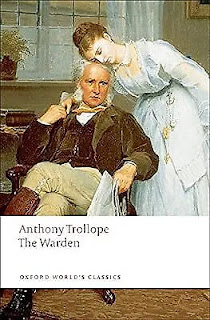The Warden by Anthony Trollope (see T is for Terrific Trollope) revolves around an important religious issue in the 19th century (and now). A clergyman is living, partly, on the income derived from the property attached to an Almshouse. As the Almshouse property value increased, the amount extended through charity remained relatively the same. The older men at the Almshouse--who are basically in assisted living--are not abused or even struggling. Nonetheless, in truth, the clergyman is living a rather well-padded existence based on a charity that gives him most of the money.
The clergyman is a good, decent, sweet-natured, timid man who honestly looks after his charges. When the disparity in the funds' distribution is brought to his attention, he is devastated.
The matter is brought to his attention through the actions of a reform-minded young man in the neighborhood, Mr. Bold, who starts the entire matter. It is exacerbated by the clergyman's son-in-law, an officious self-righteous blowhard with no tact (though even with this character, Trollope goes out of his way to point out that the events have highlighted the man's faults more than his virtues; and he did pay the lawyers' bills!), and by the newspapers.
Much of Trollope's most trenchant commentary is delivered about the news. If anyone foresaw Twitter, it was Trollope!
Here reigns a pope, self-nominated, self-consecrated...a pope hitherto afraid of no Luther...who manages his own inquisition, who punishes unbelievers...one who can excommunicate thoroughly, fearfully, radically; put you beyond the pale of men's charity, make you odious to your dearest friends, and turn you into a monster...
Bold thinks of his editor friend:
"[He accuses Harding, the clergyman] as an imposter on no other testimony than my chance conversation; but when I offer him real evidence opposed to his views, he tells me that private motives are detrimental to public justice!"
[Trollope's perhaps unfair but clever criticism of Dickens whom he calls Mr. Sentiment]:
"His good poor people are so very good; his hard rich people so very hard; and the genuinely honest so very honest."
What makes the book so remarkable is that Trollope so closely and excitingly (!) portrays what is a quite domestic matter--a small issue of a single Almshouse in a single town--yet matters tremendously to the people involved.
In the end, the clergyman resigns. A timid man with a fierce conscience and strong integrity, he is the most lovable character in the book.
But nobody is left better off. The charitable trust isn't fixed. The old men have lost a patron who truly cared about them. And the position, warden of the almshouse, is not filled, which is both good (the issue should be fixed first) and bad (the care of the elderly is left untended). It's not right or wrong. It's messy fall-out from life being life and people being people.
Barchester Chronicles was televised by the BBC in 1982. It stars such notables as Donald Pleasance, Nigel Hawthorne, Alan Rickman,
David Gwillim, and a number of extraordinary female actors, including
Phyllida Law. The Warden is quite faithful to the text and Donald Pleasance, as the Warden, naturally shines. Alan Rickman in the story's continuation, Barchester Towers, is so creepy as a self-serving sycophant, he is actually enjoyable to watch (creepy sychophants are usually not my thing but, well, Alan Rickman).
Like the book, the series is domestic, funny, devastating, and spellbinding all at once. And it doesn't do what so many current BBC productions do: "improve" on the material. Trollope was a master at making the large problem personal and the personal problem loom large. There's no point in "improving" him.





No comments:
Post a Comment